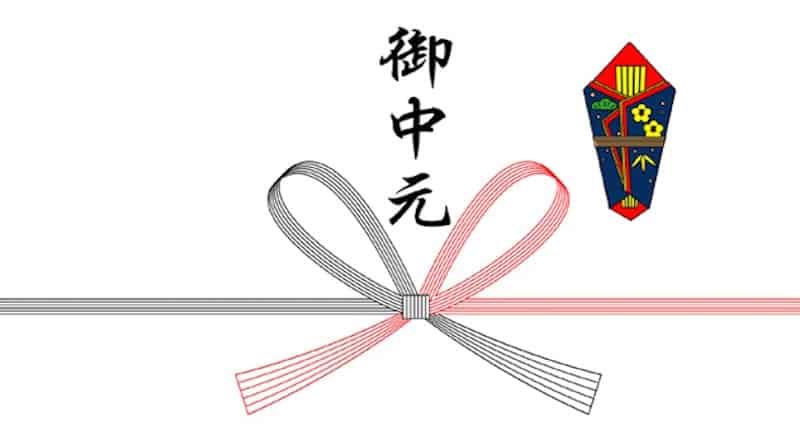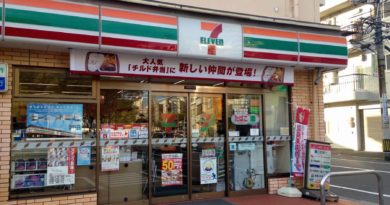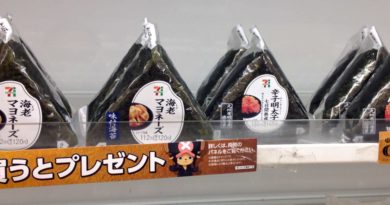Love (or summer gifts) makes the world (or at least Japan) go round
How’s everyone holding out with the humidity and all this rain? Yeah, probably the same as me. Rainy season always makes my head feel foggy, my throat dry and my mood, irritable. I like to remind myself that it’s not forever and that sunny days with clear skies are coming soon but that doesn’t necessarily mean everything is genki [元気] or what we describe as ‘happy’ in English. Anyway, my point is, that just like the rainy season, part of Japanese summer and an ingrained part of Japanese culture is the idea of summer gift giving. Oops, I don’t mean that gift giving makes me irritable, but that both rain and gifts are things I think of when I think of summer in Japan. Just wanted to clarify that! Moving on. Around this time, konbini [コンビニ] everywhere display their summer gift catalogues and people take the time to choose appropriate gifts for friends and acquaintances alike. For those of you who aren’t familiar with the idea, let me give you a brief rundown on the history or background of the concept. From a geographical point of view, the close-living arrangements between Japanese people meant that harmony or wa [和] was important and indeed, something that needed to be maintained. This idea has been passed down from generation to generation and even today, Japanese people are acutely aware of it. Of course, anything that promotes good relationships and allows someone to show their appreciation is viewed as imperative and thus, the idea of gift giving was born.
One unique aspect of summer gift-giving in Japan is the emphasis on thoughtful and personalized gifts. While generic items like sweets or alcohol are still popular, many people opt for more individualized gifts, such as a custom name necklace or a personalized accessory. These items not only show the recipient that you took the time to consider their tastes and preferences but also reflect the importance of building and maintaining close relationships in Japanese culture. Whether it’s a gift for a friend or a superior at work, the act of giving and receiving is seen as a way to strengthen social ties and foster a sense of unity and harmony within the community.
The two big occasions for gift giving during the year are summer and winter respectively. The summer gift is known as chūgen [中元] or o-chūgen [お中元], with the prefix elevating it to honorific status. Due to the idea of giri [義理], which can be translated into duty, courtesy or social obligation, the summer gift is therefore not just reserved for friends, but also as a necessary means of social ‘lubrication’ for people’s superiors such as those within the workplace. Gifts are especially important as a means of keeping in touch, especially with those you might be unable to see as often as you want. They can be sent at any time during the summer period, however, in the Tokyo area, July 20th is regarded as the latest date for when your gift should arrive, unless of course it’s being hand delivered. Historically the summer gift is also linked to Obon [お盆] or the Festival of the Dead. Although it’s now celebrated in August, in the Tokyo area it was, in the past, usually celebrated earlier in the month of July. 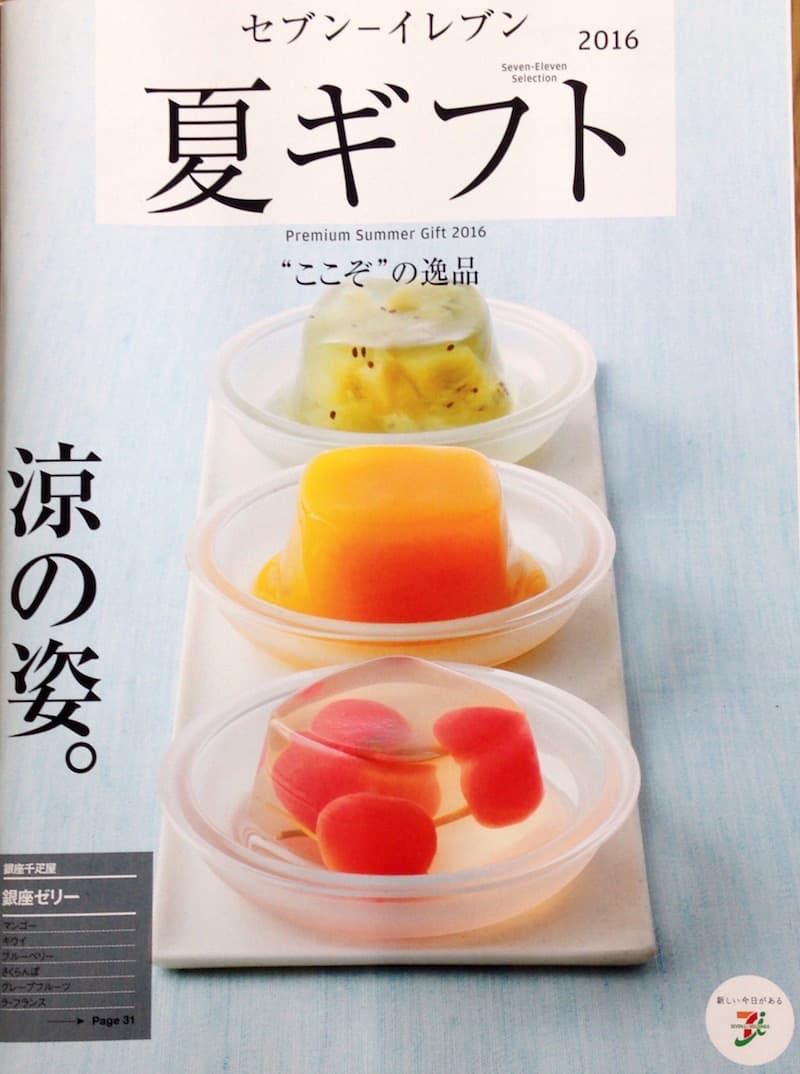 Summer gifts are usually cheaper than winter gifts and the standard budget begins at ¥3000 and ends at… well… whatever you want to spend. Typical gifts include beer, fruit or jelly desserts.
Summer gifts are usually cheaper than winter gifts and the standard budget begins at ¥3000 and ends at… well… whatever you want to spend. Typical gifts include beer, fruit or jelly desserts. 
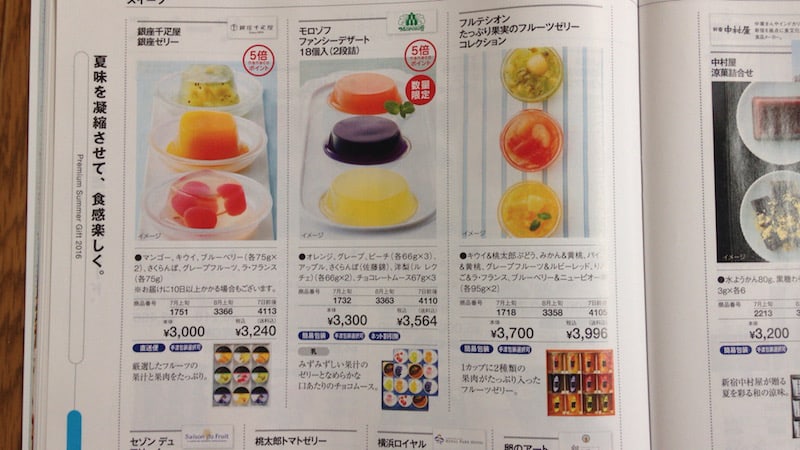 After flipping through a few catalogues, I must say that some of the prices for things like fruit or meat are INSANE.
After flipping through a few catalogues, I must say that some of the prices for things like fruit or meat are INSANE. 
 So, as I’m a cheapskate, I think I’ll be choosing the cheapest options. Just kidding. No, seriously, if I liked you a lot I’d be willing to spend money and indeed, time, in choosing a nice gift for you; I’m a thoughtful person. But… if you were anything less than that… you’d be getting the fruit juice packs. Harsh, but true, my friends.
So, as I’m a cheapskate, I think I’ll be choosing the cheapest options. Just kidding. No, seriously, if I liked you a lot I’d be willing to spend money and indeed, time, in choosing a nice gift for you; I’m a thoughtful person. But… if you were anything less than that… you’d be getting the fruit juice packs. Harsh, but true, my friends. 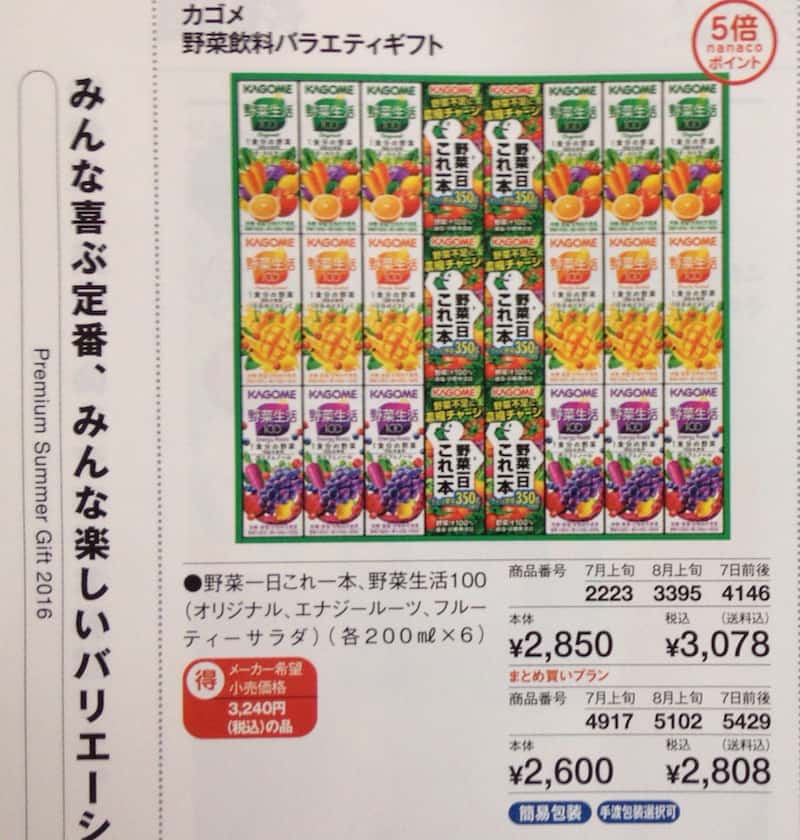 So on that note, I’m off to flip through one of the many konbini summer gift catalogues I’ve collected to search for the perfect gift… for myself. I’m thinking something expensive because I’m worth it. 🙂 See you next week!
So on that note, I’m off to flip through one of the many konbini summer gift catalogues I’ve collected to search for the perfect gift… for myself. I’m thinking something expensive because I’m worth it. 🙂 See you next week!


